biotechrabbit™ Lyo Hot Start Taq DNA Polymerase, lyophilized is a freeze-dried versions of its well-established liquid equivalent. The stabilized format allows shipment and storage without cooling. The provided reconstitution buffer ensures swift reconstitution and optimal reaction conditions for the enzyme.
Hot Start Taq DNA Polymerase is a first–choice hot–start PCR enzyme for all demanding PCR applications. The enzyme ensures high product yields with low background and without primer–dimer formation and nonspecific priming.
The Hot-Start Taq DNA Polymerase is inactive during reaction setup due to the bound antibody which is quickly released at elevated temperatures, ensuring the enzyme is active only during PCR. There is no need for prolonged heating or denaturation steps.
The optional use of 5X PCR Enhancer improves PCR results in many cases, including impure template or low template abundance.
Component | Composition |
Lyo Hot Start Taq DNA Polymerase | Lyophilized Hot Start Taq DNA Polymerase, 5 U/µl |
Taq Reconstitution Buffer | Optimized storage buffer for reconstituting Lyo Hot Start Taq DNA Polymerase, containing 50% (v/v) glycerol |
10× Reaction Buffer with MgCl2 | Optimized PCR reaction buffer including 15 mM MgCl2 |
LYO Taq DNA Polymerase RECONSTITUTION | 1) Transfer the whole content of one vial Taq Reconstitution Buffer to 2) Mix well – the lyophilisate will dissolve within seconds 3) Store the reconstituted Hot Start Taq DNA Polymerase, 5 U/µl, at -20°C |
STORAGE | Lyophilisate and Buffer: Reconstituted Hot Start Taq DNA Polymerase: |
Unit Definition
One unit is defined as the amount of enzyme required to catalyze the incorporation of 10 nmol of dNTP into acid-insoluble form in 30 minutes at 72°C in the presence of the reaction buffer.
Quality Control
Functional assay
Human genomic DNA was amplified using the DNA Polymerase and specific primers to produce a distinct band of 750 bp.
Self-priming activity
Standard PCR is carried out without primers, using the DNA Polymerase and human genomic DNA. No products were amplified.
Exonuclease assay
Linearized lambda/HindII fragments are incubated with the DNA Polymerase in a 50 µl reaction mixture for 4 h at 37°C. No degradation of DNA was observed.
Endonuclease assay
lambda DNA is incubated with the DNA Polymerase in a 50 µl reaction mixture for 4 h at 37°C. No degradation of DNA was observed.
Nick Activity
Supercoiled plasmid DNA is incubated with the DNA Polymerase in a 50 µl reaction mixture for 4 h at 37°C. No conversion of covalently closed circular DNA to nicked DNA was detected.
E. coli DNA contamination assay
A sample of the denatured DNA Polymerase is analyzed with specific primers targeting the 16S rRNA gene in qPCR for the presence of contaminating E. coli DNA. No E. coli DNA was detectable.
Prevention of PCR contamination
When assembling the amplification reactions, care should be taken to eliminate the possibility of contamination with undesired DNA.
- Use separate clean areas for preparation of samples and reaction mixtures and for cycling.
- Wear fresh gloves. Use sterile tubes and pipette tips with aerosol filters for PCR setup.
- Use only water and reagents that are free of DNA and nucleases.
- With every PCR setup, perform a contamination control reaction that does not include template DNA.
Standard PCR setup
The standard PCR protocol using biotechrabbit reaction buffer provides excellent results for most applications. Optimization might be necessary for certain conditions, such as high GC or AT content, strong template secondary structures or insufficient template purity. In such cases, optimization of template purification (see biotechrabbit nucleic acid purification kits), primer design and annealing temperature is recommended.
The best conditions for each primer-template can be optimized with the following:
- Choosing the optimal quantities of template and primers
- Determining optimal concentrations of the enzyme and magnesium ions
- Optimizing cycling conditions
If unspecific amplification occurs, the amount of DNA Polymerase and the primer concentration can be reduced. Correspondingly, these can be increased when yield is low.
Basic Protocol
- Thaw on ice and mix all reagents well, especially the dNTPs (i.e. 10 mM dNTP Mix, cat. no. BR0600201).
- Keep all reagents and reactions on ice.
- When setting up multiple reactions, prepare a master mix of water, buffer, dNTPs and polymerase. Prepare enough master mix for one more than the actual number reactions. Alternatively, use biotechrabbit Lyo Hot Start PCR ReadyMix, 2× (cat. no. BR0201101)
- Optionally, use 5× PCR Enhancer (cat. no. BR1900301) to increase the yield and to lower the background in more complicated PCR reactions (low amounts of template, impure or GC-rich template).
- Pipet the master mix into thin-walled 0.2 ml PCR tubes.
- Add template and primers separately if they are not used in all reactions.
|
Component |
Volume |
Final concentration |
|
10× Reaction Buffer with MgCl2 |
5 µl |
1× |
|
10 mM dNTP Mix |
1 µl |
200 µM |
|
Forward primer |
Variable |
0.2–1 µM |
|
Reverse primer |
Variable |
0.2–1 µM |
|
Template DNA |
Variable |
10 pg–1 μg |
|
|
Use 0.01–1 ng for plasmid or phage DNA and 0.1–1 μg for genomic DNA |
|
|
Hot Start Taq DNA Polymerase (5 U/µl) |
0.4–0.5 µl |
2–2.5 U |
|
5× PCR Enhancer (optional) |
10 µl |
1× |
|
Nuclease free water |
Variable |
|
|
Total volume |
50 µl |
|
- Mix and centrifuge briefly to collect the liquid in the bottom of the tube.
- Place in the PCR cycler.
Cycling Program
|
Step |
Temperature |
Time |
Cycles |
|
Initial activation |
95°C |
2 min |
1 |
|
Denaturation |
95°C |
30 s |
25–35 |
|
Annealing* |
(55-68°C) |
15–30 s |
25–35 |
|
|
*Recommended annealing temperature is 5°C below Tm of primers, |
||
|
Extension |
72°C |
30–60 s/kb |
25–35 |
|
Final extension |
72°C |
5 min |
1 |
|
|
To extend all incomplete PCR products |
||
|
Storage in the cycler |
4°C |
Indefinitely |
1 |
- Add loading dye solution (see DNA Loading Dye, 6×, cat. no. BR0800301) to the reactions to analyze PCR products on a gel or store them at −20°C.
You may also be interested in the following product(s)
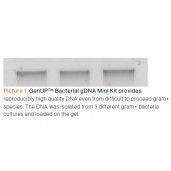
GenUP™ Bacteria gDNA Kit
Package Sizes |
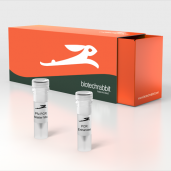
2X Pfu PCR Master Mix
Package Sizes |
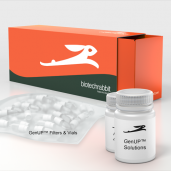
GenUP™ PCR/Gel Cleanup Kit
Package Sizes |
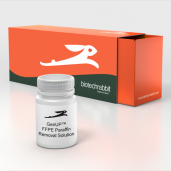
GenUP™ FFPE Paraffin Removal Solution
Package Sizes |
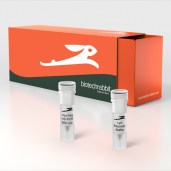
2X YourTaq™ Hot-Start PCR Master Mix, lyophilized
Package Sizes |
